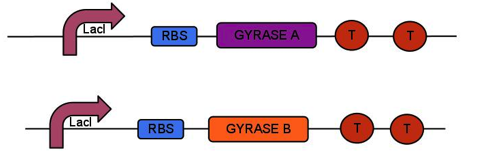Team:UCL London/Research/Supercoiliology
From 2011.igem.org
Supercoiliology Concept
Plasmid-based DNA vaccines encode and deliver essential information to the desired cell to produce proteins of therapeutic value. In this case, it may be a malaria protein, a HIV subunit, tumour antigen or even a drug which will be able to treat a certain kind of illness. However, naturally occurring relaxed or open circular plasmid molecules are quite sensitive to shear stress and display very low transfection efficiency (which means that the desired plasmid DNA does not reach the target cell effectively) and therefore does not attain their full therapeutic potency. The manufacturing and therapeutic effectiveness of these valuable molecules. In order to overcome these problems, the 2011 UCL iGEM team has devised a solution.In supercoiliology, we aim to increase the production quantity of supercoiled target plasmids by over-expressing the enzyme gyrase, which is a unique topoisomerase that regulates the topology of DNA molecules inside Escherichia coli bacteria. As a result this will enable us to achieve both higher yield and purity in order to meet the FDA regulations laid out for the production of plasmid based vaccines for clinical use. Furthermore, increasing the level of supercoiling in our product will also make the plasmids more robust and resistant to the shear stress encountered during the manufacturing process, when compared to their “fragile” non-supercoiled counterparts. And eventually, this increase in compactness of the plasmid molecules will improve the transfection efficiency and will ensure more effective delivery to the target cell, where it will reach in sufficient quantity and will therefore be able to mount a proper immune response.
 "
"
